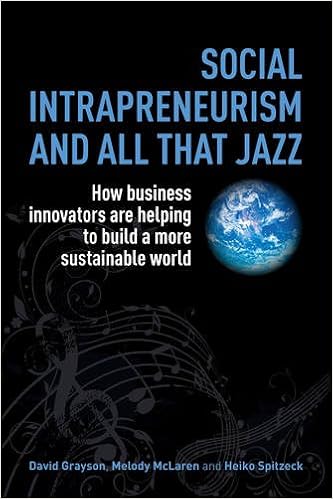Corporations aren’t known as being the best global citizens, but they are improving because of the inspiring work of thousands of social intrapreneurs that work within them. These changemakers, at all levels within every business, are figuring out innovative ways to help their business do less harm and more good, while helping the business grow.
No matter where you work, you can lead a social intrapreneurial initiative that will make you, your institution, and the world better. This guide will help you understand what social intrapreneurism is, how it started, and how to start your own initiative that will make the world a better place. The main sections in this guide are:
- What is Social Intrapreneurship?
- Who Is a Social Intrapreneur, and Who Can Become One?
- How to Find Social Intrapreneurial Opportunities Within Your Company
- Where to Learn More About Social Intrapreneurship
- How To Be a Better Social Intrapreneur
As Bill Gates shared at the 2008 World Economic Forum:
I hope corporations will dedicate a percentage of their top innovators’ time to issues that could help people left out of the global economy… It is a focused use of what your company does best. It is a great form of creative capitalism, because it takes the brainpower and … dedicates some of it to improving the lives of everyone else
Indeed, when it comes to solving the world’s toughest challenges, social intrapreneurs are needed as much as entrepreneurs.
What is Social Intrapreneurship?
Social intrapreneurs are employees that start initiatives within existing institutions — corporate, education, public, or nonprofit — that create social and/or environmental good, while moving the institution’s mission forward.
As a few examples, Tamara diCaprio at Microsoft launched an new reporting practice that makes every business unit within Microsoft fiscally accountable for its energy consumption. The launch of +Acumen Courses at Acumen is a social intrapreneurial initiative at a nonprofit. There are even successful intrapreneurial stories in governments and universities.
According to Paul Grayson, author of Social Intrapreneurism and All That Jazz: How Business Innovators are Helping to Build a More Sustainable World, social intrapreneurs are:
People within a large corporation who take direct initiative for innovations that address social or environmental challenges while also creating commercial value for the company… They leverage existing infrastructures and organisational capabilities to deliver social value on a large scale…
Social intrapreneurs aim to generate entirely new forms of commercial value through significant innovations in products, services, processes or business models for their employers.
Who Is a Social Intrapreneur, and Who Can Become One?
In 2014, Ashoka featured a story on Forbes calling Social Intrapreneurs the Most Valuable Employees of 2014.
Anybody can be a social intrapreneur. But, like its cousin entrepreneurship, it takes an appetite for risk and failure. According to Skoll’s publication, The Social Intrapreneur’s Field Guide for Corporate Changemakers, they have a few things in common. They:
- Are more ambitious for social change than for personal wealth and advancement
- Are willing and able to take risks
- Have an understanding of business process and priorities as well as sustainability imperatives
- Balance tactical and strategic skill-sets
- Are adept at fighting and surviving cynicism, caution and the status quo
- Are work across sectors, business units, and skill sets
- Never stop learning, innovating, and simplifying
In his captivating and widely popular TEDx Talk, Be The Change You Wish To See In Your Company, Gib Bulloch shares his personal story about becoming a social intrapreneur.
How to Find Social Intrapreneurial Opportunities Within Your Company
Social intrapreneur initiatives can be of any size, and all companies have many opportunities lurking just out of sight. To find opportunities at your company, try these 4 steps:
Step 1: Find Potential Opportunities
To have a successful initiative, it has to align with your business’s existing strategy and goals. Luckily, there are at least 7 research backed reasons that company’s support social innovation. To start your search, read existing documentation about your company’s goals and priorities, and look for opportunities where they need partners and/or to innovate. In addition, have coffee chats with members of leadership, diversity, human resource, recruitment, corporate responsibility, and innovation teams to ask questions about their big projects and where they need the most help.
In addition to searching within your company, also look at your company’s key upstream and downstream partners, and some of their key initiatives.
Step 2: Connect The Dots
Look for ways that your company can benefit by being more socially responsible. Here are a few examples:
- Greening your supply chain can lower production costs, like this example at UPS.
- Launching leadership development programs can retain top talent, as demonstrated by this study with leading corporations like Microsoft, GSK, BD, EY, and Credit Suisse.
- Having more volunteer and giving activities can better recruit talent
- Product teams innovating for new markets can benefit by partnering with social impact organizations already working there
Step 3: Find Partners and Build a Business Case
Use your internal and external network to build a business case. And trust us, there is always a business case for social responsibility. Create a high quality proposal that you can put in front of your company’s leadership and Board that shows how the program deserves budget and resources, and how it will benefit people, planet, and profits.
Step 4: Start Small
It’s the most fun to think about BIG ideas, but to get there, you have to start small. When you are pitching your social intrapreneurial idea, it’s a good idea to paint a vision for the future, but when it comes to asking for budget, you should start small. In your proposal, ask for just enough budget to get a small pilot off the ground. Then launch it as quickly as possible and show that you’re able to deliver results. If you can do that, you can easily make the case for a bigger ask in the future.
As you do start, try and first start initiatives in-line with successful programs implement elsewhere. As an example, corporate giving programs and international volunteering programs are almost guaranteed to provide benefits to the bottom line and to the planet.
Where Can I Learn More About Social Intrapreneurship?
There are increasingly more resources, articles, talks, and books about social intrapreneurship. The following are must-reads:
- Check out Aspen Institute’s Fellowship for Intrapreneurs
- Read Skoll’s Field Guide to Social Intrapreneurship and about its work fueling innovation
- Join the League of Intrapreneurs
- Read Deloitte’s research on Intrapreneurs in Government and Grayson’s Report: An Extra Force for Sustainability
- Take +Acumen’s courses on Lean Startup Principles for Social Impact and Social Entrepreneurship 101
- Read TechChange’s article About Intrapreneurship and The Institute of Sustainability Professional’s articles on Becoming a Social Intrapreneur
- Follow social intrapreneurial leaders like Ashoka, Changemakers, Joe Agoada, David Grayson, Gib Bulloch, Skoll, and The League of Social Intrapreneurs on Twittter
- Watch this video from Skoll about Driving Change From Within and this video from Cranfield University about the Anatomy of an Intrapreneur
- Read 8 Traits of Social Intrapreneurs and The Venture’s 3 Tips on Becoming a Social Intrapreneur
- Download the Social Intrapreneur’s DNA Report
This story about mid-level managers at Vodafone and Safaricom launching M-PEASE provides plenty of lessons for the aspiring intrapreneur (You can also read a good case study of it here).
How To Be a Better Social Intrapreneur
Ultimately, as a social intrapreneur, you will be leading change. As such, learning more about leadership is critical. Take the TED Talk MBA and also review this list of articles, videos, and books to help people become better changemakers. In addition, here are 6 must read books:
- David Grayson’s book mentioned above
- Tim Mohin’s book: A Tree Hugger’s Guide to Working in Business
- Changing Your Company from the Inside Out by Gerald David and Christopher White
- Switch: How to Change Things When Change is Hard by Chip and Dan Heath
- The Misfit Economy by Alexa Clay and Kyra Maya Phillips
- The Power of Unreasonable People by
Most importantly, you just have to go do something.
Launch a small donation campaign or Bright Fund for your team, pilot an international corporate volunteering program, or start putting pressure on your suppliers to report on their environmental and social impact. No matter where you work, you can start something. And is true with all things in life, you’ll learn more by doing than you will by reading.
Social intrapreneurship isn’t easy, but nothing is that is worth fighting for. As John Elkington President of SustainAbility writes in the Forward of the Field Guide to Social Intrapreneurship
“[ social intrapreneurs] cannot turn their backs on the savage global inequities and environmental degradation in the world, or on the profound social and economic value to be gained by delivering market solutions.“
We, for one, are thankful that you can’t turn your backs on the world’s biggest problems… and your talents and innovative minds are needed more than ever before.
We hope this guide gives you the push to become a social intrapreneur this year. And if you need a little extra moxy, remember the words of Elkington, “Don’t ask for permission, ask for forgiveness.”
As next steps, checkout the Social Intrapreneur’s DNA report and infographic.








